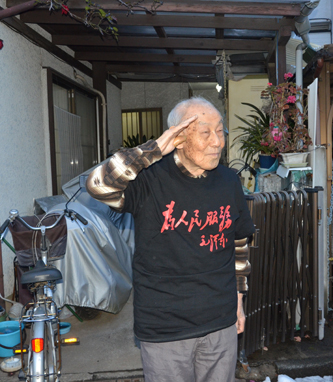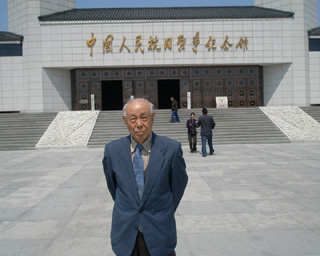How a Japanese invader became Chinese soldier
- By Zhang Rui
 0 Comment(s)
0 Comment(s) Print
Print E-mail China.org.cn, September 4, 2014
E-mail China.org.cn, September 4, 2014
A 95-year-old Japanese veteran remembers his unique experience serving the Chinese army and becoming a friend of China ahead of the anniversary of victory in World War II.
|
|
|
Kobayashi Kancho [File photo] |
In the winter of 1944, Kobayashi Kancho recalled, that he persuaded the Japanese army to surrender in Rizhao City, Shandong Province. "I said, 'Brothers, I want to tell you something from my heart, I was a Japanese soldier in Qingdao, but I was captured by China's Eighth Route Army. However they didn't kill me but cured my wounds instead, treated me like brother and educated me. "
He continued, "I gradually realized that Japan was an invader. Japanese soldiers came to China to kill people, rape women and robbed China's resources and labor. China's army never came to Japan to do anything. Why did the Chinese army fight us? Because they were defending their country and people. "
China marked the 69th anniversary of Victory Day in the Anti-Japanese War for the first time since legislature ruled it an official observance day. China's top leaders, including President Xi Jinping and Premier Li Keqiang, attended a ceremony held Wednesday morning at the Museum of the War of the Chinese People's Resistance against Japanese Aggression.
Kobayashi Kancho was once a Japanese soldier, but after he was captured, he learned more about the war and became awakened. He later joined the Chinese army and become a friendly figure toward China after he came back to Japan. Currently he is chairman of the Japanese Anti-War Alliance, where all the members are Japanese people who joined the Chinese army.
"China has contributed a lot to the global anti-Fascist war, and the establishment of the anniversary day is very meaningful," the veteran said. "If young people knew more about war, they would never want it to happen again."
As he remembered, Kobayashi passed the monastery lawyer examination in 1939 and was going to be an abbot and would open a law firm. However, he was enrolled into the Japanese army and had to put down his Buddhist sutras and take up a weapon.
Kobayashi was captured by the Chinese army in June 1941 when he was on a mission. Chinese soldiers treated him and proved to him what the Japanese armies did to innocent people. Kobayashi felt guilty and understood the nature of the Japanese war against China, so he joined the Chinese army in September 1941 to fight against the atrocities of the Japanese invaders.
He and his fellow Japanese soldiers, who realized the truth of the invasion and helped the Chinese people, kept on trying to persuade the Japanese army to surrender. In December 1955, 10 years after World War II ended and Japan surrendered to the world powers, he went back to Japan.

Kobayashi Kancho visited China again in 2005 and attended activities to mark the 60th anniversary of the global victory against Fascism. When he went back to Japan, he gave speeches to tell people about China's huge development and its changes in the past decades.
"Now, my only wish is to tell the next generations about the truth of the invasion history while I'm still alive," he said. "China and Japan's friendship won’t come easy, we have to cherish it and protect it, and not allow history to go backward. Chinese and Japanese people should be friends from generation to generation."
Kobayashi is worried about the current Japan's political circumstances. He said Japan's prime ministers should never pay any respect to the controversial Yasukuni Shrine. The Shinto shrine honors Japan's nearly 2.5 million war dead, including 14 convicted World War II war criminals. Many of Japan's neighbors see it as a symbol of the country’s militaristic past.
He added that paying respect to that shrine means supporting Japan's past invasions, and it also means denying the victory in the global war against Fascism.







Go to Forum >>0 Comment(s)